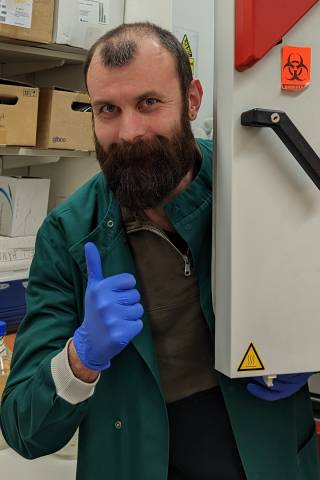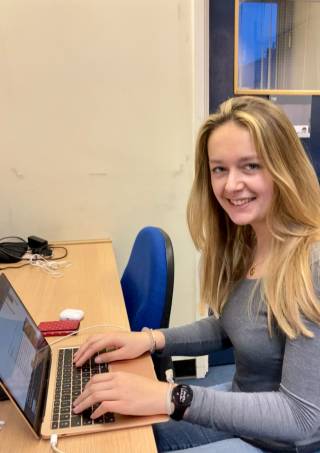Plun-Favreau Laboratory – Mitophagy and neurodegeneration
After a PhD in France (Angers University) in signal transduction, Helene did her postdoctoral work with Professor Julian Downward at CRUK. The discoveries and work she did in this area led her towards neurodegeneration and she was successful in being appointed to an MRC Career Development Fellowship to work in the Department of Molecular Neuroscience at UCL Institute of Neurology. Since her arrival in 2007 Helene has carried out some significant work on the molecular pathways associated with mitophagy and other mitochondrial dysfunctions in neurodegenerative disorders. The approaches they have undertaken require live cell microscopy and complex molecular and cellular biology, and provide a more complete picture of the pathways that play a role in the pathogenesis of neurodegeneration.
Our research
In recent years, it has become clear that even in clinically distinct neurodegenerative conditions, there are common underlying themes in how the neurons become sick and die. One such theme is a breakdown in the maintenance of mitochondria, which plays a central role in Parkinson’s disease and in other neurodegenerative conditions.
Mitochondria are the ‘energy powerhouses’ of cells. Their function is vital in long-lived neurons, where mitochondria must be maintained for an entire lifetime, and where a great deal of energy is required for them to function and survive.
The selective autophagy of damaged mitochondria (mitophagy) is critical for cell survival as it maintains optimal cellular energy production whilst avoiding the toxic accumulation of damaged mitochondria. Important information about the control of mitophagy has come from the study of the genes associated with autosomal recessive Parkinson’s disease. Of particular interest, PINK1 (mitochondrial kinase) and Parkin (E3-ubiquitin ligase) have been found to play crucial roles in mitophagy.
Against this background, our lab focuses on the following themes:
- Understanding further the mitophagy process
- Identifying the major molecular players in PINK1-induced mitophagy.
- Unravelling the upstream pathways that regulate the mitophagy process.
- Assessing mitophagy and other mitochondrial dysfunctions in iPSC-derived neurons from patients with Parkinson’s disease, and with other neurodegenerative diseases (E.g Alzheimer’s disease, Frontotemporal Dementia, Amyotrophic Lateral Sclerosis, mitochondrial DNA disease etc).
Our ultimate goal is to identify compounds that are able to modulate mitophagy and rescue mitochondrial pathophysiology and neuronal death.
10 selected publications
- Soutar MPM, Melandri D, O'Callaghan B, Annuario E, Monaghan AE, Welsh NJ, D'Sa K, Guelfi S, Zhang D, Pittman A, Trabzuni D, Verboven AHA, Pan KS, Kia DA, Bictash M, Gandhi S, Houlden H, Cookson MR, Kasri NN, Wood NW, Singleton AB, Hardy J, Whiting PJ, Blauwendraat C, Whitworth AJ, Manzoni C, Ryten M, Lewis PA, Plun-Favreau H (2022). Regulation of mitophagy by the NSL complex underlies genetic risk for Parkinson's disease at 16q11.2 and MAPT H1 loci. Brain. 2022 Sep 8.
- Poon A, Saini H, Sethi S, O'Sullivan GA, Plun-Favreau H, Wray S, Dawson LA, McCarthy JM (2021). The role of SQSTM1 (p62) in mitochondrial function and clearance in human cortical neurons. Stem Cell Reports. 2021 May 11;16(5):1276-1289.
- Soutar MPM, Kempthorne L, Annuario E, Luft C, Wray S, Ketteler R, Ludtmann MHR, Plun-Favreau H (2019). FBS/BSA media concentration determines CCCP's ability to depolarize mitochondria and activate PINK1-PRKN mitophagy. Autophagy. 2019 Nov;15(11):2002-2011.
- Soutar MPM, Kempthorne L, Miyakawa S, Annuario E, Melandri D, Harley J, O'Sullivan GA, Wray S, Hancock DC, Cookson MR, Downward J, Carlton M, Plun-Favreau H (2018). AKT signalling selectively regulates PINK1 mitophagy in SHSY5Y cells and human iPSC-derived neurons. Sci Rep. Jun 11;8(1):8855.
- Denny P, Feuermann M, Hill DP, Lovering RC, Plun-Favreau H, Roncaglia P (2017). Autophagy. 2018;14(3):419-436.
- Delgado-Campubri M, Esteras N, Soutar MP, Plun-Favreau H*, Abramov AY* (2016). *co-last authorship. Deficiency of Parkinson's disease-related gene Fbxo7 is associated with impaired mitochondrial metabolism by PARP activation. Cell Death Differ. 24(1):120-131.
- Tufi R, Gandhi S, de Castro IP, Lehmann S, Angelova PR, Dinsdale D, Deas E, Plun-Favreau H, Nicotera P, Abramov AY, Willis AE, Mallucci GR, Loh SHY, Martins LM (2014). Enhancing nucleotide metabolism protects against mitochondrial dysfunction and neurodegeneration in a PINK1 model of Parkinson's disease.
- Burchell VS, Nelson DE, Sanchez-Martinez A, Delgado-Camprubi M, Wray S, Lewis PA, Houlden H, Abramov AY, Hardy J, Whitworth AJ, Wood NW, Laman H, Plun-Favreau H (2013). The Parkinson's disease-linked proteins Fbxo7 and Parkin interact to mediate mitophagy. Nat. Neurosci. 16, 1257-1265.
- Bartolome F, Burchell VS, Prezza E, Wu HC, Wray S, Mahoney C, Fox N, Calvo A, Canosa A, Moglia C, Mandrioli J, Chio A, Orrell RW, Houlden H, Hardy J, Abramov AY, Plun-Favreau H (2013). Pathogenic VCP mutations induce mitochondrial uncoupling and reduced ATP levels. Neuron 10;78(1):57-64.
- Fitzgerald JC, Camprubi MD, Dunn L, Wu HC, Ip NY, Kruger R, Martins LM, Wood NW, Plun-Favreau H (2012). Phosphorylation of HtrA2 by cyclin-dependent kinase-5 is important for mitochondrial function. Cell Death Differ. 19(2), 257-266.
 Close
Close










